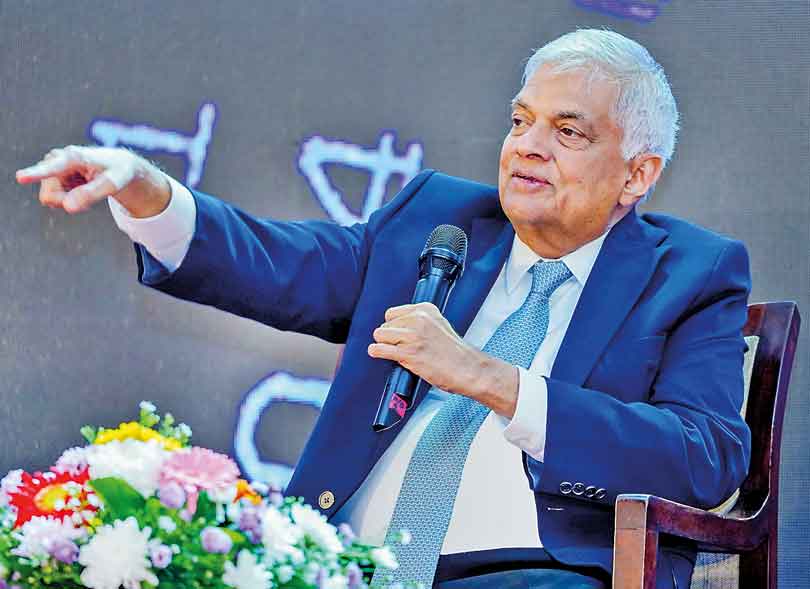Thursday Feb 19, 2026
Thursday Feb 19, 2026
Tuesday, 27 August 2024 02:31 - - {{hitsCtrl.values.hits}}

President Ranil Wickremesinghe
By Divya Thotawatte
In embracing the digital future of Sri Lanka, President Ranil Wickremesinghe stated that digitisation would soon also be extended to the election system, as proposed by the commission led by former Chief Justice Priyasad Depp.
The discussion took place at an IT Professionals’ Forum, themed ‘Coding the Nation’s Future.’
Industry experts, including World Bank Senior Digital Development Specialist Siddhartha Raja, spoke on the digital future of the country and the industry’s seven-year plan, collaboratively initiated with the World Bank, to contribute $ 15 billion to Sri Lanka’s GDP by 2030.
Speaking at the event, the President outlined his vision for a digital and export-driven future. He explained that, while building Sri Lanka’s economy by digitising different sectors like agriculture and education, the same transformation would continue to the election system. With the commission led by former Chief Justice Depp, the Government would be able to digitise elections. “But I believe we should first test it with the Provincial Council elections before adopting it for national level elections,” he said.
Wickremesinghe further highlighted the necessity of digital innovation for the country’s development, especially in terms of the economy. “It is easier said than done to become an export-oriented economy in the second or third decade of the 21st century. The transformation then should be of technology.”
He said that, in terms of Sri Lanka’s digital and economic transformation, the Government was looking at a market-driven approach to policies and research in science and technology. This is because previous Government policies on science and technology were State-driven, which sometimes yielded minimal results.
“It will be market-driven and driven by the private sector. We have the National Science Foundation under our Science and Technology Act, and we use that to support research in pure science. The new council is geared to the market and will be responsible with its own fund for commercially-driven research. Not only will we fund it, but we will ask for a cut on it to ensure that you all become successful.”
The soon-to-be established Technology and Innovation Council, Digital Transformation Agency, and the Centre for AI will drive this transformation, he said.
In further strategising the digitalisation economy, Wickremesinghe said: “We have to first get in with infrastructure. We have to get the law in place. And thirdly, our job is to produce the human capital/human resources that are needed. We just have to keep churning out more and more and more with the knowledge that at least 25% will go abroad. As you pay better salaries, they will stay here.”
Wickremesinghe explained that changing the infrastructure of schools built for the 1950s to fit the 2030s and 2040s was essential. However, it would take more than 10 years to be completed. Moreover, vocational education is also being radically reorganised, with training centres being consolidated into vocational education colleges under Sri Lanka’s Vocational Skills Agency, he said.
The University College of Technology and Management will also be established to offer associate degrees to ensure that present State universities will expand tech facilities and promote non-Government universities in that field.
“The Government will ensure that four new universities are established. One will be Prime Minister Modi’s gift to us; a campus from the Chennai IIT in Galaha. The three other technology universities will be located in Kurunegala, Seethawaka, and Siyane. There will also be the expansion of the Green University.”
“We have also decided that we will piggyback on what India has done rather than spend our time rediscovering the wheel. It takes us a long time to rediscover the wheel. Sometimes we want to do it by ourselves, which takes us about 10 or 15 years. And then we argue whether the wheel should be a circle or a square. I think it is much better that we build on what is available and expand.”
Additionally, The President stressed the need for a $ 15 billion digital economy to lay the foundation for the $ 85 billion economy. By mid-century, the goal is to achieve a $ 350 billion economy or more. Given the proximity to tech-savvy regions like Tamil Nadu and Bangalore, Sri Lanka could align its growth with these advanced neighbours and leverage their technological expertise, he added.